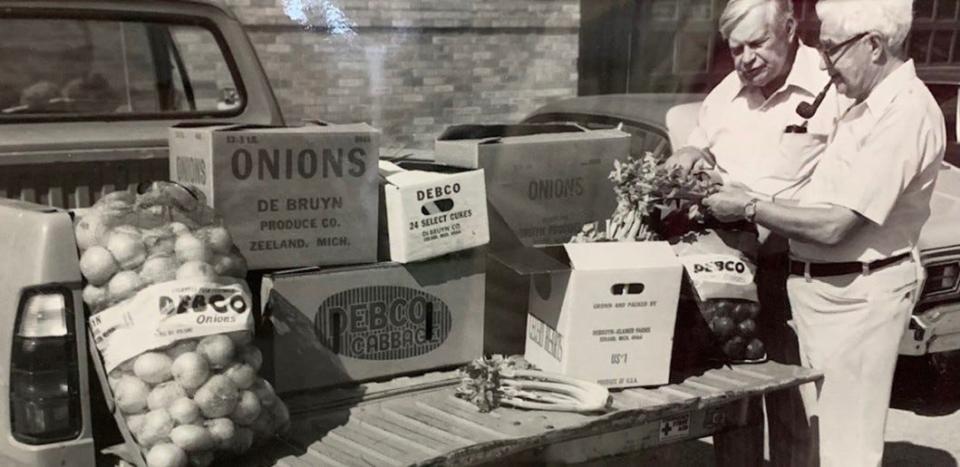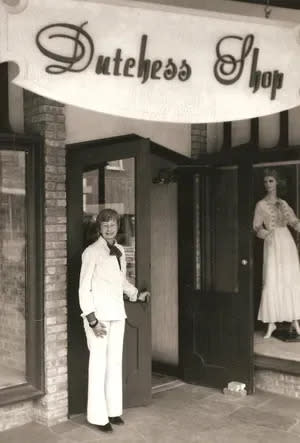Steve VanderVeen: The final chapter of the DeBruyns

David DeBruyn was born in 1877. In 1893, he began working in the LaHuis Grocery and Dry Goods Store. He married Henrietta “Trixie” Bosch and, together, they had three children: Robert, Donald and Evelyn.
Evie DeBruyn Van Dorp was the subject of two previous columns.
More History: Early characters in Zeeland's business district
More History: The story of Evelyn DeBruyn
More History: Port Sheldon, Harmon Bosch and Evelyn Van Dorp
In 1927, while working for LaHuis, David started buying produce from local farmers. In 1928, after the LaHuises unexpectedly died in California, David purchased the business.
Then, during the Great Depression, David not only brokered farmers’ produce, but also sold them seed. As his geographic boundary expanded, and because he had to monitor the quality of the produce he purchased and sold, he frequently traveled, and would take his sons, Robert and Donald, with him.
Sometimes he would send all three of his children on the road for collections. Not yet willing to give up the grocery, household and dry goods businesses, he entrusted them to Evelyn.

As brokering produce was his passion, David sold the grocery business to George Van Eenenaam, the flooring business to Jason Wagoner and the dry goods and clothing business to Cory Poest.
During World War II, DeBruyn Produce and Seed supplied produce to army camps. To do so, David built a modern refrigeration and cold storage unit and employed German prisoners of war.
David died in 1947.
After the war, and under the leadership of his sons, the DeBruyn Produce and Seed continued to grow, aided by the development of the interstate highway system and the growth of supermarkets.
To get a dependable supply of produce, Donald and Robert traveled extensively and contracted with farmers in the west and south, something Robert enjoyed more so than Donald. In fact, Robert would spend up to six months of the year in Texas and Arizona, bidding on fields, inspecting harvests, contracting with truckers and employing salespeople.
In 1955, the DeBruyns separated the more volatile and travel-intensive produce brokering business from the more predictable seed business. Based on their personality and passion, they also separated responsibility: Robert, Sr. took the produce business and Donald the seed business.

Eventually Robert’s son, Bob, joined the produce business. Like his father, Bob loved to travel. He also loved one-on-one negotiations and onions. Between the 1970s and 1990s, DeBruyn’s supply chain extended to Oregon, Colorado, Arizona, New Mexico, Texas and Georgia — as well as to Mexico and Peru — and included company-owned farms, processing and packing facilities.
One such facility was near Byron Center and included a machine Bob invented to efficiently cut big carrots into baby carrots. On the demand side, DeBruyn’s customers, in addition to supermarket chains, included fast food restaurants, among them Taco Bell and Red Lobster.
Tragically, Bob died from a biking accident in 2009.
Bob’s cousin, Ken, joined his father, Donald, at DeBruyn Seed when he was a student at Hope College. On his way to and from class, Ken would stop at Smith Douglas near James Street and River Avenue and the Holland Co-op at College Avenue and Seventh Street. He also spent a summer out of state at a seed supplier. After Don died in 1990, Ken he took over DeBruyn Seed.
At the time, retail customers would buy seeds from a clerk, who would scoop them out of bins. On busy days in the spring season, customers would line up outside the door and around the building.
Subscribe: Learn more about our latest subscription offers!
To improve efficiency, Ken’s operations manager, Jan Meeuwsen, introduced a self-service system, which involved pre-packaging the seeds and putting photos of the mature plants and plant care instructions on the package. To get photos, Jan would grow plants herself. Later, Ken added lawn, garden and bird seed products to DeBruyn’s product mix.
On the wholesale side, DeBruyn Seed continued to sell to farmers. Over time, they added many garden stores as customers. In 2004, DeBruyn sold almost 225 tons of seed potatoes, 10 tons of sweet corn seed gardens, 38 tons of grass seed for lawns and 130 tons of black sunflower seeds for bird feeders.
Today DeBruyn, also supplies flower seeds to Disney’s EPCOT theme park and lima bean seeds to the Max Planck Society in Germany.
Information for the Van Dorp and DeBruyn articles comes from interviews with Evelyn, Bob and Ken DeBruyn in 2005, and a recent interview with Jan Meeuwsen.
Other sources include Hope College's Digital Commons, MiGenWeb and Wikipedia.
— Community Columnist Steve VanderVeen is a resident of Holland. Contact him through start-upacademeinc.com.
This article originally appeared on The Holland Sentinel: Steve VanderVeen: The final chapter of the DeBruyns
